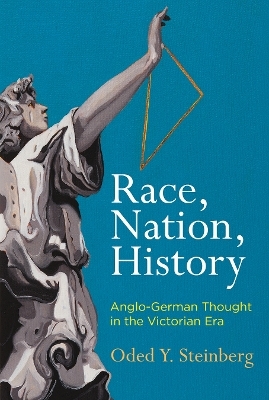
Race, Nation, History
Anglo-German Thought in the Victorian Era
Seiten
2019
University of Pennsylvania Press (Verlag)
978-0-8122-5137-1 (ISBN)
University of Pennsylvania Press (Verlag)
978-0-8122-5137-1 (ISBN)
In Race, Nation, History, Oded Y. Steinberg examines the way a series of nineteenth-century scholars in England and Germany first constructed and then questioned the periodization of history into ancient, medieval, and modern eras, shaping the way we continue to think about the past and present of Western civilization at a fundamental level. Steinberg explores this topic by tracing the deep connections between the idea of epochal periodization and concepts of race and nation that were prevalent at the time—especially the role that Germanic or Teutonic tribes were assumed to play in the unfolding of Western history.
Steinberg shows how English scholars such as Thomas Arnold, Williams Stubbs, and John Richard Green; and German scholars such as Christian Karl Josias von Bunsen, Max Müller, and Reinhold Pauli built on the notion of a shared Teutonic kinship to establish a correlation between the division of time and the ascent or descent of races or nations. For example, although they viewed the Germanic tribes' conquest of the Roman Empire in A.D. 476 as a formative event that symbolized the transformation from antiquity to the Middle Ages, they did so by highlighting the injection of a new and dominant ethnoracial character into the decaying empire. But they also rejected the idea that the fifth century A.D. was the most decisive era in historical periodization, advocating instead for a historical continuity that emphasized the significance of the Germanic tribes' influence on the making of the nations of modern Europe. Concluding with character studies of E. A. Freeman, James Bryce, and J. B. Bury, Steinberg demonstrates the ways in which the innovative schemes devised by this community of Victorian historians for the division of historical time relied on the cornerstone of race.
Steinberg shows how English scholars such as Thomas Arnold, Williams Stubbs, and John Richard Green; and German scholars such as Christian Karl Josias von Bunsen, Max Müller, and Reinhold Pauli built on the notion of a shared Teutonic kinship to establish a correlation between the division of time and the ascent or descent of races or nations. For example, although they viewed the Germanic tribes' conquest of the Roman Empire in A.D. 476 as a formative event that symbolized the transformation from antiquity to the Middle Ages, they did so by highlighting the injection of a new and dominant ethnoracial character into the decaying empire. But they also rejected the idea that the fifth century A.D. was the most decisive era in historical periodization, advocating instead for a historical continuity that emphasized the significance of the Germanic tribes' influence on the making of the nations of modern Europe. Concluding with character studies of E. A. Freeman, James Bryce, and J. B. Bury, Steinberg demonstrates the ways in which the innovative schemes devised by this community of Victorian historians for the division of historical time relied on the cornerstone of race.
Oded Y. Steinberg is a fellow at the Hubert H. Humphrey Center for Social Research, Ben-Gurion University of the Negev and lecturer at the European Forum at the Hebrew University of Jerusalem.
List of Abbreviations
Introduction. Racial Time
Chapter 1. The English Teutonic Circle
Chapter 2. Roman Decline and Teutonic Rejuvenation: The Racial German and English Gemeinschaft of Scholars (1850-90)
Chapter 3. Racial History: The Convergence of Race and Periodization
Chapter 4. The Unique Historical Periodization of E. A. Freeman
Chapter 5. Teutonism and Romanism: James Bryce's Holy Roman Empire
Chapter 6. The Illusion of Finality: Bury and the Unity of the East
Epilogue. Values and Interests
Notes
Bibliography
Index
Acknowledgments
| Erscheinungsdatum | 24.07.2019 |
|---|---|
| Reihe/Serie | Intellectual History of the Modern Age |
| Verlagsort | Pennsylvania |
| Sprache | englisch |
| Maße | 152 x 229 mm |
| Themenwelt | Geschichte ► Allgemeine Geschichte ► Neuzeit (bis 1918) |
| Sozialwissenschaften | |
| ISBN-10 | 0-8122-5137-7 / 0812251377 |
| ISBN-13 | 978-0-8122-5137-1 / 9780812251371 |
| Zustand | Neuware |
| Haben Sie eine Frage zum Produkt? |
Mehr entdecken
aus dem Bereich
aus dem Bereich
Europa 1848/49 und der Kampf für eine neue Welt
Buch | Hardcover (2023)
DVA (Verlag)
48,00 €
Giordano Bruno - ein ketzerisches Leben
Buch | Hardcover (2024)
C.H.Beck (Verlag)
29,90 €


